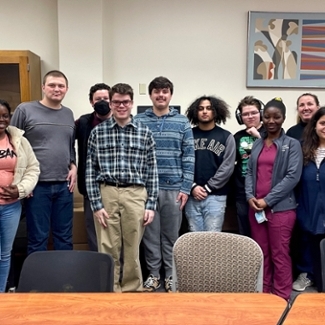This week is about celebrating neurodiversity and focusing on the talents of those with neurodivergent brains. Neurodiversity is part of human diversity. Like fingerprints, no two brains are quite alike.

Neurodiversity Celebration Week (March 13 through 19), founded in 2018 by Siena Castellon, became a movement to change how learning differences are perceived and to change the narrative to focus equally on seeing talents and strengths.
“Neurodiversity is the idea that neurological differences like autism and ADHD are the result of normal, natural variation in the human genome,” writes John Elder Robison, a scholar in residence and co-chair of the Neurodiversity Working Group at the College of William & Mary in a blog on Psychology Today’s website. Robison, who himself has Asperger’s Syndrome, adds, “Indeed, many individuals who embrace the concept of neurodiversity believe that people with differences do not need to be cured; they need help and accommodation instead.”
Harvard Business Review’s article on “Neurodiversity as a Competitive Advantage,” stresses that neurodivergent candidates should be embraced in the workforce, as they are an untapped talent pool. Many neurodivergent individuals tend to “have higher-than-average abilities; research shows that some conditions, including autism and dyslexia, can bestow special skills in pattern recognition, memory or mathematics.” NOVA is proud of students showcasing their talents and coming together.
NOVA’s Neurodiversity Club has just launched. Student John Suringa started the club because he felt it was so needed. He currently serves as its president. “One of the important reasons this club was founded was to educate people about neurodiversity,” said Suringa. “I also started this club because I was born with a disorder called tuberous sclerosis that affected a little bit of how I could think and how I could learn information, like large pieces of information.”
Currently, the Neurodiversity Club meets on Wednesdays at 2 p.m. on the Annandale Campus (CM-363). For details on the club, feel free to reach out to the club advisors, Melissa Chabot, Assistant professor of communication studies and Andrew Falion, program coordinator for College Steps.
“A central premise of the neurodiversity movement is that variations in neurological development and functioning across humans are a natural and valuable part of human variation,” said Chabot. “It is important for our NOVA community to provide space for our neurodivergent students to share their experiences so that we can structure inclusive and accessible campus environments.”
As club advisors, Chabot and Falion are committed to increasing understanding and support of the neurodivergent members of the NOVA community, which includes staff and faculty as well as students at NOVA.
Falion, who also works for College Steps, a program that Provides academic coaching and executive functioning skills support to neurodivergent students, loves the fact that the Neurodiversity Club is run by the students. Fellows from the College Steps program come and help assist the students.
“It’s great that they have a space where students can share stories, have fun, talk about their experiences and support each other on this path in college. We have so many great individuals that have a lot to bring to the NOVA community. I encourage a lot of College Steps students and peer mentors to join the Neurodiversity Club.”
Club member John Bartholomaus (who goes by Jack) notes the club brings a sense of belonging and shared ideas to a group of students eager to learn. “When we get to learn about stuff that we have in common with one another, it makes me feel good to know that I’m not alone and that there are other people that are just like me. I am glad that other people on the autism spectrum could really use a club like this.”
Sean Drisco, who started at NOVA in 2020, is pursuing degrees in IT and graphic design. He said he found out about the club through a teacher. When the club’s president John Suringa asked him if he has a particular learning difference that he wants people to learn more about, Sean said, “Well, I can learn both visually and audibly.”
UPCOMING NEURODIVERSITY EVENTS:
Wednesday, April 5 at 1 p.m. via Zoom
The Annandale Campus Lyceum Committee is hosting autism advocates Megan Ashburn and Jules Edwards, authors of the book, “I Will Die On this Hill: Autistic Adults, Autism Parents, and the Children Who Deserve a Better World.”
- Meghan Ashburn’s website, Not An Autism Mom, is loaded with resources to help educators and parents support Autistic children inside and outside the classroom.
- Jules Edwards is an Anishinaabe writer and a disability justice advocate. Edwards writes as "Autistic, Typing.”
This event can be accessed via Zoom. For more information about Lyceum events, please contact: Manori Nadesalingam, Committee Chair, at mnadesalingam@nvcc.edu.
Thursday, April 11, time Annandale Campus (CA-302)
Neurodiversity Club: Movie Screening and Student Panel
- “Autism Goes to College” 1h, 2m (also available on Kanopy with NOVA credentials) and will be followed by Student Response Panel. The film follows five college students with autism into their lives and classrooms.
For more information about this upcoming event, please contact Melissa Chabot, at mchabot@nvcc.edu.
Further Resources:
The College Steps' mission is "To empower students living with learning and social challenges through structured post-secondary support. Working closely with high schools, colleges and families, we emphasize peer-to-peer services that build confidence and success."
College Steps partners with the NOVA Annandale, Alexandria and Loudoun campuses and 11 other college campuses on the east coast. To learn more about getting involved, please contact Andrew Falion at afalion@nvcc.edu or https://www.collegesteps.org/.
Learn More About Neurodiversity: https://libguides.nvcc.edu/neurodiversity
Stacey Arth, a NOVA librarian on the Annandale Campus has created an innovative library guide on neurodiversity.